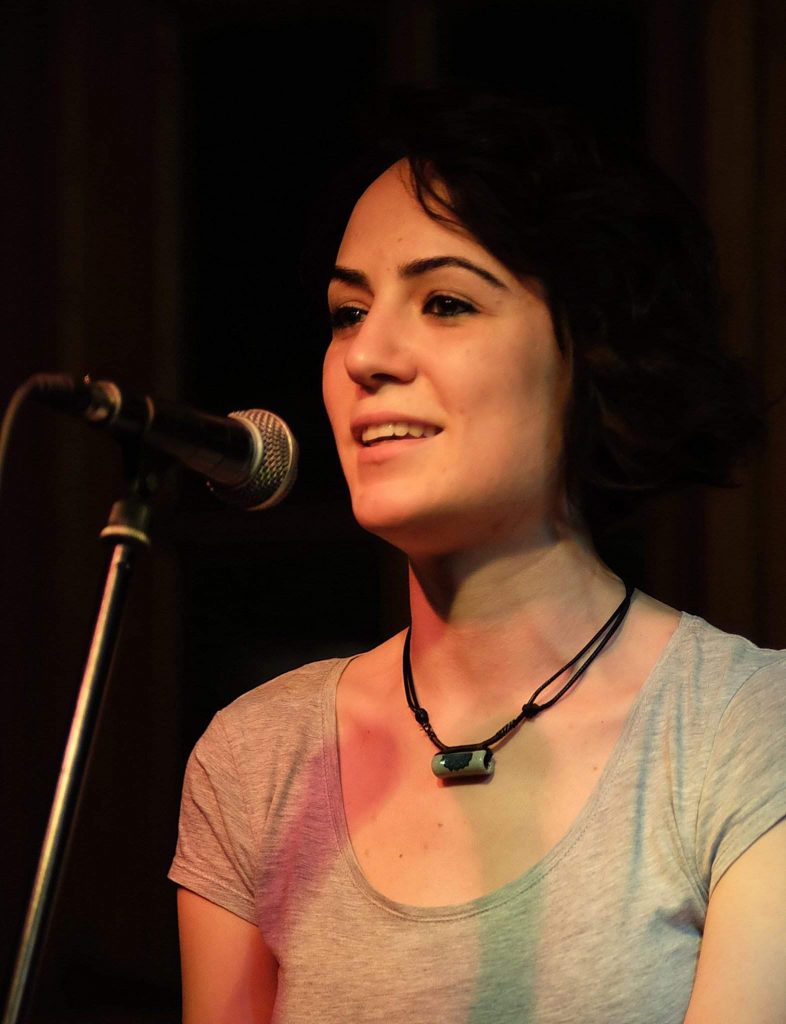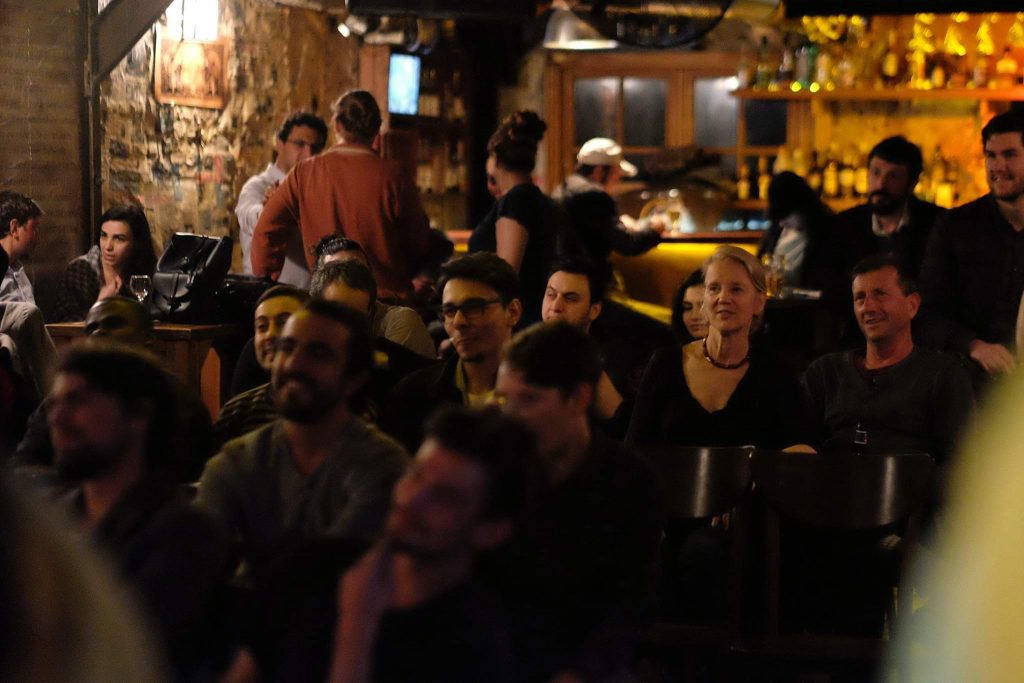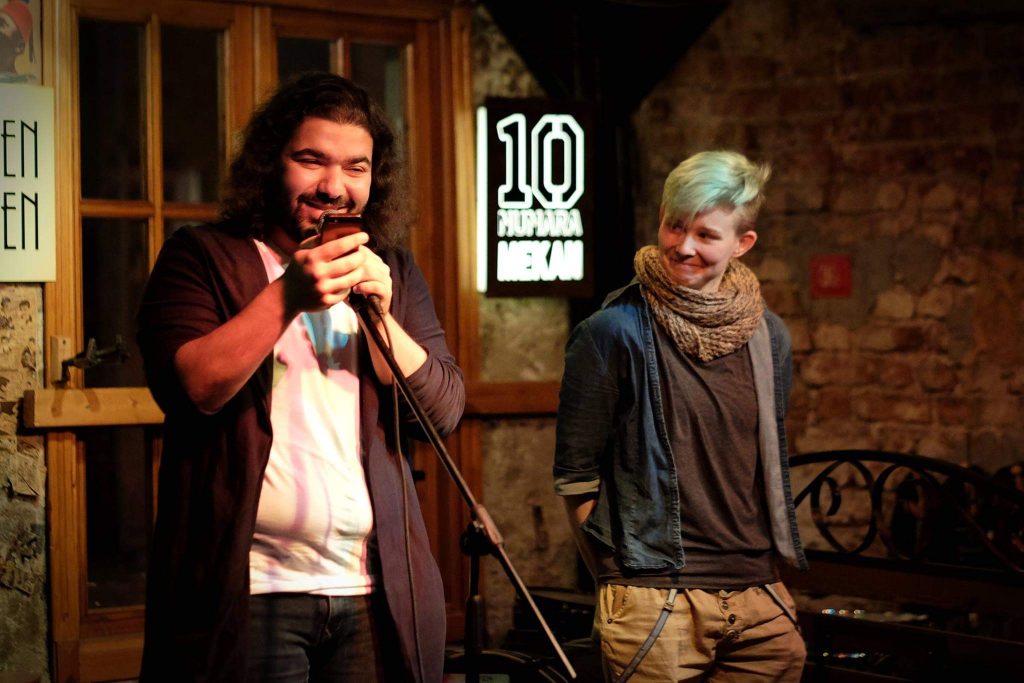I have been a regular performer and audience member at Spoken Word since coming to Istanbul four years ago. At the time, the founder, Merve Pehlivan, was spending a year in Paris and had temporarily delegated the role of emcee to American fiction writer Justin Pahl. I began with reading my poetry, which was consistently met with encouragement and appreciation. The following year, Merve returned from Paris and resumed her role as emcee and Justin returned to the United States. Over the years, it has been something I look forward to almost every Tuesday night and I have connected with some of my most intimate friends through this community, including Merve herself. Merve hosts Spoken Word with grace, humility, conviction, and encouragement, always forgiving of whatever mistakes or anxiety the performers may demonstrate. She cultivates an atmosphere that embraces everyone’s uniqueness and distinct style of creative expression. Truly, no open mic community is more welcoming. All that is required is the courage to take the stage.

Spoken Word has always attracted a diversity not just of ethnic, gender, and sexual demographics, but also of talents and skills. In one evening of Spoken Word, one can hear live music, with or without instrumental backgrounds, poetry, fiction, memoirs, improv theater, stand up comedy, and even unprepared rants and raves. People share both their own original material and material written by others. While the most commonly used language is English, even this is not a rigid rule. On the Spoken Word stage, any language is allowed, and over the years these languages have included Turkish, Arabic, Farsi, Spanish, French, Italian, Kurdish, Armenian, Russian, Chinese, Japanese, and even Sanskrit. The only rules are a six-minute time limit and, of course, the three “red lines”: no sexism, no racism, and no homophobia. Inspired by this diversity, after years of reading my poetry there, I decided to explore the medium of acting and brought in monologues from my favorite playwright, Tennessee Williams (best known for A Streetcar Named Desire). At the time I was unsure how the audience would react to something so distinctly divergent from anything I had seen at Spoken Word previously. Even this was embraced by the community, and many people affirmed to me how they appreciated my acting style and willingness to branch out into new mediums.
I met Merve at a café in Kadıköy to discuss her views and perspective on this community that has helped so many people find their creative oases and believing mirrors here in Istanbul.

What is the history of Spoken Word Istanbul?
We started almost seven years ago now in January of 2012. It was a few years after I came back from Paris, where there is this Spoken Word Paris community since 2006 and I was a part of that community when I was there. It was a very similar crowd to what we have here. It was a group of mostly Anglophone writers, artists, performers, and poets, and when I came back to Turkey I wanted to have a similar community and I wondered where these people were. I said to myself, there must be English-speaking writers in Istanbul. I just need to find them. I was writing in English as well, so I wanted to meet with Anglophone writers. I first had the idea myself and I brainstormed with close groups of friends that I had. I said, hey, this is the idea and there is nothing similar in Turkey. So we were concerned about how we could get support, how we could find a place. One of the concerns that we had was what if it becomes instantly politicized and draws unwanted attention from law enforcement, from politicians? So we did keep that in mind. But it ended up not being much of an issue. We were just left alone, and still are, because we are a group of foreigners, or that’s how we are perceived. We’re not seen as a politically threatening group. So I thought Taksim would be a good place to start. And I had some suggestions from some friends and so I went to the side streets of Istiklal to Asmalı Mescit, to several other places and I explained the concept to bar owners. I said, this is it, do you have a stage or something that can be turned into a stage? This is what we want. And we started at a theater lobby on Istiklal. It was not a proper stage. It was just a theater lobby.
When did you move to the current venue, Arsen Lupen?
Before we came to Arsen Lupen, we were at several other places. We were in Kara Kedi, which is a beautiful bar where bands played on Asmalı Mescit very close to Tünel. We were also in Kooperatif for less than a year. It is very close to the Ağa Camii. So we were in three different places before we came to Arsen Lupen. We came to Arsen Lupen in September of 2014. And we’ve been there since.
What do you enjoy most about Spoken Word?
My favorite thing is a personal dimension about Spoken Word. I am very motivated by people I’ve never even met coming up to me and saying, “This is a great thing you’re doing.”, “I feel very motivated to speak myself next week.”, “I really appreciate your effort.”, “This is a very accepting community.”. When I get that feedback, and I get it very, very frequently, almost regularly, I feel fulfilled.
What are your favorite memories or accomplishments?
I think the biggest thing that happened to Spoken Word is we were featured in a short film in the Atlantic magazine. That was the biggest accomplishment and acknowledgment that Spoken Word has received. A director from New York got in touch with us, so that was the biggest thing. But in terms of performances, I’m very deeply moved when somebody shares something so personal about themselves, dare to be vulnerable in front of strangers. A couple of years ago, we had a Spoken Worder who came up and read a poem about his friend who had been shot right in front of him in Tahrir Square in Cairo and that was a very deeply poignant moment. And those things I can’t very easily forget.
What are some future plans?
A couple of years ago, we had this beautiful, fruitful writers’ retreat. Perhaps we can do another one if we can get enough participants. That would be a thing to consider again. But in terms of Spoken Word per se, I don’t really have any extra plans because I think what is specific about Spoken Word is that its format isn’t supposed to change. People change. Stories change. And there is a circulation of stories, of poetry, of art, so the format of Spoken Word doesn’t really need to change in my opinion. I toyed with the idea of introducing themes. But I spoke with some Spoken Worders and some regulars, and they were not very into the idea, so I dropped that. So sometimes I think about introducing themes, but it is not happening any time soon.

Can you speak about the three red lines? Why are they important?
I don’t remember exactly the emergence of the three red lines. It was sometime in 2012. When we first started, the rules were not there. But I came up with the idea later on in the next couple of months. I think the rules are important because over and over again, I hear the reputation of Spoken Word outside my sphere of influence.
I’m just the host so I don’t really have control over the content of performances or the reception of that content. But time and again, I hear many people talking about Spoken Word in several keywords: Welcoming, accepting, nonjudgmental. And I believe that these attributes are there thanks to the three red lines.
That said, and I’ve expressed this several times at Spoken Word, I sometimes have second thoughts about the idea of free expression, which I consider of utmost importance, and the three red lines. So we’re banning certain forms of discourse while advocating freedom of expression, and doesn’t that contradict with each other? So I sometimes have that dilemma in my head.
I believe that racism, sexism, and homophobia are issues that are very relevant in the city and the country that we live in. There are countless people who suffer from these forms of abuse and these ways of behavior every single day. And I want Spoken Word to be a space where people who are constantly exposed to homophobia, sexism, and racism can have a breath of fresh air and can feel welcome and at home. They can feel that they have friends and people that will listen to them without any form of judgment. I consider these three issues—racism, sexism, and homophobia—very critical problems that we still suffer from in our society. And I’m not allowing that on our stage.
Can you speak about the diversity of Spoken Word?
I think the main reason we’re so diverse is the simple reason that we speak English. And many people from different backgrounds speak English because that’s the medium of communication for all of us. So it starts with a technical point of departure. But also, when we first started, because I knew that I wanted it to be predominately English, I reached out to Erasmus student groups and Couchsurfing and Meetup groups, where people from different backgrounds already are meeting up through their events.
So that was how I started. And because, like today, the expat community in Istanbul is quite tightknit, by word of mouth, Spoken Word became popular and people began talking about it to other friends. So that’s one side of it because we have residents and people who live in Istanbul. And they talk to each other about Spoken Word and they come. And also, over time, when we started to have media coverage, travelers who came to Istanbul for a couple of days and were looking for expat friendly events in Istanbul, found Spoken Word on the internet. One thing which I find very important when it comes to the nature of Spoken Word Istanbul here is that we are not immune to the city, the country, and the region at large.
On the very first night of Spoken Word, we had a Syrian performer, who used a pseudonym “Joe.” I still don’t know his real name. The political situation in Syria was still not a full-fledged civil war yet, we still read about the “Arab Spring” in the media. Joe talked about horrible atrocities in the city he came from and we were really shocked. He represented the early emergence of the Syrian refugee community that we have at Spoken Word now. That was in early 2012. I went to Paris for a year and was absent for a year, and when I came back, I found out how the demographics of Spoken Word had changed between 2014 and 2015. We started having many Syrian refugees because Istanbul became populated with refugees. After 2016, the year when Turkey suffered from numerous terrorist attacks, we lost a significant number of Erasmus students. So the diversity is also reflective of the political landscape of Turkey and the demographics of the city.
Is there anything else you want to say about Spoken Word?
I think Spoken Word is a place where we can find an outlet for our creative efforts, an outlet for some pent-up emotions at times. A friend referred to Spoken Word last week as therapeutic, which I find quite relevant. It can be therapeutic because mostly you address yourself to an audience that will support you. It’s a supportive community. It’s an accepting community. So I would recommend people to come to join us if they want what can sometimes be a very unpredictable mixture of artists and performances and acts of courage. I believe that performing in front of an audience of strangers is always an act of courage. I never forget that.
Spoken Word Istanbul takes place every Tuesday evening at 8:30 pm at Arsen Lupen, located at Mis Sk. no:15/4 off of Istiklal Caddesi. To perform, sign up with Merve at the event. Performances are limited to six minutes, with occasional exceptions at Merve’s discretion. Performers who violate the red lines (no sexism, racism, or homophobia) will be excluded from the stage for the remainder of the night. There is no cover charge. For more information visit their pages on Facebook and Instagram.
Images courtesy of Anas Alnajjar.









